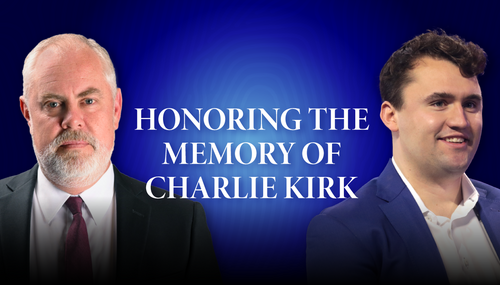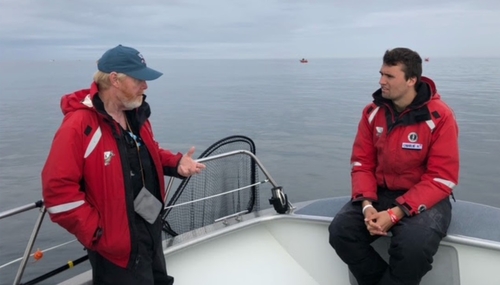
Smith then referenced "personal attacks" made against McClellan by Bob Dole: "Among the people who have come out to say disparaging things about you, Bob Dole called you a 'miserable creature.' What is it like to have been so much a part of a certain -- of that political culture and have that culture turn on you?"
Later, McClellan explained that: "...it's time to move beyond this destructive culture in Washington and end the partisan warfare that has existed for the past fifteen years, if not longer. And that's the larger message in the book that they can take away from it." Smith replied by asking: "Do you think Republicans will look at this and take this seriously at all?" So according to Smith, the "destructive culture in Washington" is a Republican problem.
McClellan responded to Smith:
MCCLELLAN: Well, right now I think it's the initial reaction phase. I think it's hard for them to move beyond this whole mentality that, you know, when we're addressing these hard issues, you just get caught up in this back and forth
SMITH: Because you -- you're looked at as Judas. But in the end, after the dust settles will people say --
MCCLELLAN: Well I -- yeah. I was raised on speaking up and speaking out. And that's what I'm doing. This is an extension of my career in public service. Another way to continue to making a positive difference. And I think it has struck a nerve, but it needed to strike a nerve.
Here is the full transcript of the segment:
8:31AM TEASER
HARRY SMITH: Also coming up, speaking of Washington, because you really gave us the amazing transition before. This is another one of those amazing transitions. Former White House Press Secretary Scott McClellan is going to be along to talk about the aftermath and the reaction to his quite controversial book.
8:33AM SEGMENT:
HARRY SMITH: It has been an interesting week or so for the former White House Press Secretary Scott McClellan. His memoir has created a firestorm of controversy. And now he's come under attack from some key players in Washington. And joining me now is Scott McClellan. Good morning.
SCOTT MCCLELLAN: Good morning Harry. Glad to be with you.
SMITH: How you holding up?
MCCLELLAN: Well, well. It's tough when you take on the system. The system kind of fights back and engages in some personal attacks and misrepresentations of what's in the book. But it's important that this larger message get out. And that's really taking on the destructive permanent campaign culture in Washington.
SMITH: Among the people who have come out to say disparaging things about you, Bob Dole called you a 'miserable creature.' What is it like to have been so much a part of a certain -- of that political culture and have that culture turn on you?
MCCLELLAN: Well, you know, I expected it to some extent. You know, these are some unpleasant truths and hard realities that I'm trying to address in the book. And no one's really refuting the key themes and perspectives in the book. What they're doing is taking some of these personal attacks and misrepresentations and trying to shift the focus away from what this book talks about. And I think it's important to get it back on the larger message in the book.
SMITH: At least immediately, some of the people reacted and said, well, you know, Scott was out of his league, he was naive. In retrospect, do some of those seem -- things seem applicable to you?
MCCLELLAN: Well, I certainly was idealistic, that we would come to Washington and really change it. The president, as you know, was a bipartisan leader in Texas. 70 percent plus approval rating. And that was -- this is the story of a young idealistic political person who thought, you know, that he came into public service to really do things for the better. And we got to Washington, we got caught up in this culture and things didn't turn out the way we thought. They went badly off course. And I'm trying to address why in this book.
SMITH: Yeah. You go through this process of self-analysis.
MCCLELLAN: I do.
SMITH: If you had a chance for do-overs, one do-over in this whole thing, what would you have done differently?
MCCLELLAN: I think I would have spoken up more internally at the time about some of my concerns. Now, I had some different views back then. I got caught up in this culture just like everybody else. It really -- it really, you know, pulls everybody into it. And you get in this politics is war mentality. We need to move beyond that, restore honesty and civility and bipartisanship to the process.
SMITH: Yeah. If people in this whole controversy over the last week, if you want them -- people to take away one thing, what would it be?
MCCLELLAN: That it's time to move beyond this destructive culture in Washington and end the partisan warfare that has existed for the past fifteen years, if not longer. And that's the larger message in the book that they can take away from it.
SMITH: Do you think Republicans will look at this and take this seriously at all?
MCCLELLAN: Well, right now I think it's the initial reaction phase. I think it's hard for them to move beyond this whole mentality that, you know, when we're addressing these hard issues, you just get caught up in this back and forth
SMITH: Because you -- you're looked at as Judas. But in the end, after the dust settles will people say --
MCCLELLAN: Well I -- yeah. I was raised on speaking up and speaking out. And that's what I'm doing. This is an extension of my career in public service. Another way to continue to making a positive difference. And I think it has struck a nerve, but it needed to strike a nerve.
SMITH: Yeah. Scott good to see you.
MCCLELLAN: Harry, thanks for having me.
SMITH: Thanks for coming in. Do appreciate it.




